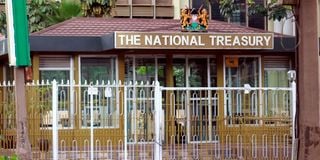Kenya pays first Sh35bn for fuel in government-to-government deal

The National Treasury Building in Nairobi.
Kenya on Monday paid Sh35.25 billion ($238.84 million) to three Gulf oil marketing companies that have been supplying the country with fuel on credit for the past six months.
The payment is part of the government-to-government deal signed in March with Saudi Aramco, Abu Dhabi Oil Company (ADNOC) and Emirates National Oil Company (ENOC) to supply fuel to Kenya for a period of nine months with a six-month grace period.
The deal was aimed at slowing the depreciation of the Kenyan shilling against the US dollar. The local currency has depreciated by about 22 per cent against the greenback over the past year.
The state identified the cyclical rush for dollar purchases by more than 100 local oil marketing companies to pay for fuel supplies as a key driver of the depreciation, leading to the deal.
Under the deal, three banks - KCB, I&M and Diamond Trust Bank (DTB) - which issued letters of credit (LCs), gradually bought dollars over the six-month period to pay for fuel.
Yesterday, the National Treasury said LCs worth $238.84 million were settled on Monday, days ahead of their maturity, indicating the availability of dollars to make the payment.
An LC issued on 3 April for $83.8 million for premium grade petrol matured on 25 September, another issued on 17 March for $72.2 million for kerosene matured on 29 September, while another issued on 24 April for $82.79 million for petrol matured on 13 October.
According to the Treasury, a dollar escrow account where the funds are deposited currently holds $1 billion, while another Kenyan shilling escrow account holds Sh115 billion, ready to be converted into dollars for repayment when subsequent LCs mature.
The shilling traded at an average of Sh147.64 against the greenback yesterday, but the government claims the deal has been a success as it has slowed the rate of depreciation of the local currency.
"The G-to-G deal has eased pressure on the Kenyan shilling with the rate of depreciation against the US dollar dropping from a high of 3 per cent per month to 1 per cent," Energy and Petroleum Regulatory Authority (Epra) director general Daniel Kiptoo said last week.
About 34 cargoes of petrol, diesel and kerosene have been delivered under the deal, which has been extended for another year. Mr Kiptoo said the deal has even attracted interest from other East African Community (EAC) countries who want to emulate it to ease pressure on their own currencies.
The Epra boss also revealed that Kenya has successfully renegotiated premiums with the three Gulf oil companies that supply the country with fuel under the government-to-government oil import deal.
Mr Kiptoo said the government had managed to reduce the premium on petrol from $97.5 per metric tonne to $90, diesel from $118 to $88 and kerosene from $114.25 to $111.75.
"The Kenyan government has successfully renegotiated the government to government premiums," he said.
The depreciation of the local currency has been a major headache for the government as it has ballooned the country's foreign debt and inflated the price of imports. Kenya is a net importer of goods including petroleum products, food, machinery and equipment, pharmaceuticals, textiles and electronics.
"Exchange rate stability and a slowdown in currency depreciation support economic recovery and slow the growth of public debt," the Treasury said.
Fuel prices have continued to skyrocket in recent months, offsetting gains from a slight reduction in food prices, which has kept the cost of living high.
This month, Epra increased the price of petrol by Sh16.96 per litre, diesel by Sh21.32 and kerosene by Sh33.13.
This means that motorists in Nairobi now pay a record Sh211.64 for petrol, Sh200.99 for diesel and Sh202.61 for kerosene. This is the first time that retail fuel prices in Nairobi have risen above the Sh200 mark.





